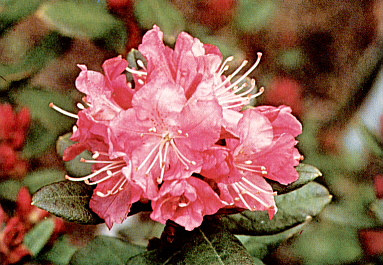The Last Time I Saw Warren - A Tribute
David G. Leach, Madison, Ohio

|
|
R. 'Anna Baldsiefen'
Photo by Lawrence Pierce |
Warren Baldsiefen died last spring, in March as - a matter of fact. I have been trying ever since to obtain the dust-dry facts of his biography but I should have long since realized that they are unimportant.
Warren was the outsize guy, the classic super in everything he was and did. To rhododendron hobbyists he was the foremost introducer of new and improved hybrids in the East, with a ferociously expensive pricelist - until the plants arrived, and the bemused recipient unpacked the finest, most meticulously grown rhododendrons that had likely ever been seen.
There are no other words for it: Warren Baldsiefen loved rhododendrons. They were his life. He was fascinated by everything about them, and he was the best judge of them, the most acute observer of their attributes that I have known.
I remember when I first visited his little plot of a nursery alongside a railroad embankment at Rochelle Park, New Jersey, about 25 years ago. He was not long out of the air force as a navigator on bombing missions over Germany. He had started from scratch, with Guy Nearing's advice and nothing more, and it was not easy going. But he was enthusiastic, so eager to learn, and so proud of the few hundred young plants he had managed to propagate. And he had reason to be.
Of course he prospered. He was not satisfied with just pinching the terminal buds on his yearlings. He cut them back to the previous year's growth. The loss of a year's size increase in commercial value meant nothing compared with the luxuriantly branched plants which brought joy to his perfectionist's eye.
It was typical of him that, when he had outgrown the land at Rochelle Park in 1964, and then at his next location near Paramus, he moved his nursery to Bellevale, New York, because he felt that he owed it to his customers to produce his plants in a hard and testing climate. He could have, so easily, moved southward to a longer growing season, lower costs and a larger production.
Warren Baldsiefen introduced nearly all of the new hybrids of merit produced in the East for about one human generation. Gable's, Amateis', Dexter's, he appraised them all with a benign but selective and informed sagacity.
Everybody in the rhododendron world knew of Warren but few knew him. He was a private person; he abhorred crowds and meetings. His inner resources made him self-sufficient. But his kindness and generosity were legendary, his exploits a source of wonder to his friends.
He was nationally known as a skier and expert on avalanche control. I remember the excitement and exhilaration when the two of us fired shells from an old army howitzer at Alta to bring down a huge snow overhang on a peak which threatened to engulf skiers on a lower slope. In fact, if not in title, he headed the avalanche control in Utah for years, narrowly escaping with his life time and again, in a Hemingway-like dance of death, the age-old challenge of man to nature. Warren had a Bunyonesque charisma.
My old friend was tall, attractive, exuberantly expressive, wondrously vital and alive, obstreperously optimistic, always humorous. He was expert in so many ways: as a scuba diver, as an ornithologist, as a trout fisherman. A 50-mile hike was just a warm-up to him. Every winter he and his wife, Suzie, shared for a spell the life of the Indians who inhabit the strange gothic otherworld in the Grand Canyon. I know not the color of his belt, but his karate knowledge enabled him to break three planks at a blow before my astonished eyes.
The last time I saw Warren he was, as always, incapable of being discouraged or despondent. It was buoyant just to be in his presence. There was never enough time to fulfill his interests. He was unique. He was a scholar, a naturalist, an authority on the works of Charles Dickens. He was a humanitarian, with a vast indignation for exploitation of his fellow man, and an equally encompassing love. He died of cancer. He was 52.